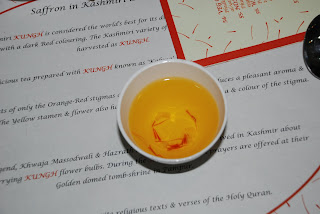Just before Deepavali, I'd visited a new Kashmiri restaurant on Castle Street to review it for Bangalore Mirror. The review can be read here at the site, or can be read below along with pictures.
Food: Excellent
$$$: Not too expensive; our bill for all that we had came to less than 1000, which is great!
Service: Very good
Verdict: Must visit
Extra Info: Since Castle St. is a one way, either enter from the Lifestyle side (Richmond Road), or if coming from Brigade Road, go past Castle St. and turn into the next left (Wood St.) and then turn left again to enter Castle St.
Kungh, #32, Castle Street, off Brigade Road, Ashoknagar, Bangalore. Phone: 41126043
Bending your mind past the turmoil in Kashmir and focusing on the finer aspects that define Kashmir and Kashmiri culture can be very fruitful. Yes, food is what I speak of. The common assumption is that the Muslim cuisine in Kashmir is the same as the Mughlai-tandoori cuisine. Although the Mughals did have an influence in the Kashmiri cuisine that we see today, the cuisine isn't anywhere close to the Lucknowi or Nizami (Hyderabadi) cuisine. Evolving over hundreds of years, the food was initially influenced by the Buddhists and Pandits, and later by the invasion of Timur, bringing in influences from Central Asia and Persia. To do justice to Kashmiri food required not just a Kashmiri, but someone who knew his onions from his tomatoes when it came to Kashmiri food. My guest Quasim Tanga, a Kashmiri by birth, is an engineering graduate from Manipal, and is director of AQ&Z Consulting, specialising in joint developments, investments, and advisory on commercial real estate. He turned out to be a treasure trove of gastronomic information, giving me details from simple things like the variety of breads baked by Kashmiri bakers to the use of yogurt to marinate meat (introduced by the Persians).
Kungh (pronounced kong) is the Kashmiri word for the most expensive spice in the world, saffron, which gets its name from Latin saffrenum, which comes from Persian za'ferân, which comes from Arabic za'farān, from the Arabic word for yellow, aṣfar (those interested can check how saffron became the colour of the Buddhist monks’ robe). Perched on Castle Street off Brigade road, Kungh, conceptualised by Mr. Anwar Nawab and run by Mr. Javaid Ahmed, offers Bangaloreans authentic Kashmiri cuisine, complete with a waza, or chef, from Kashmir, with completely organic ingredients, in crisp white interiors, and a seating capacity of around 30 or so.
We started off with a Kahwa, a traditional saffron-based tea. Javaid asked us to try it without sugar, and although it did taste good, with the aromas playing a pivotal role, adding a little sugar heightened the taste.
Onto solid stuff, and we were told the Kashmiri favourite, tabak maaz (lamb ribs), is made only on prior notice (the smell of the fat may put off gourmands who aren't used to it). So a seekh kabab (minced lamb meat cooked on skewers) and waza cockur (chicken marinated in traditional Kashmiri spices) was what we started off with. The seekh kabab was extremely soft and well flavoured, and (thankfully) didn't have any colouring. Cut into small ringlets, it's probably one of the best I've had in Bangalore. The waza cockur came with large pieces of chicken, and although tasty, we thought the chicken was a bit stringy.
For our main course, we decided to stick to the Kashmiri staple of rice, and Quasim opined that a rista and a yakhni were the dishes to test the mettle of the waza. Yakhni is a yogurt based meat dish, having fennel, cinnamon, cardamom and ginger, topped with mustard oil, and it was brilliant. The subtle flavours of the limited ingredients along with the soft meatballs (a result of pounding the meat to make it tender) was very nicely complemented by the spicier rista, which makes use of red chilli powder (and again, there was no evidence of food colouring) and no yogurt. Both went wonderfully well with the rice. It may be a very ‘Indian’ trait, but I've always believed that there's something truly remarkable about eating rice with your hands, and this meal vindicated my stand.
A prominent paneer dish, ruwangan chaman, was something we wanted to try, but we were informed that it was all over by lunch time (we had come for dinner), testimony to the brilliance of the dish. For dessert, we had rosewater-flavoured phirni, saffron kheer, and khubani meetha (one of the non-Kashmiri dishes). I loved the kheer and the phirni, while Quasim didn't quite like the rosewater taste in the phirni (a purist, I suppose!). The khubani meetha (apricot compote) was very nice, but I've had better, in terms of texture.
With Javaid running a well-oiled operation and the passion running through his veins evident, Kungh certainly possesses the traits to satisfy the demands of the burgeoning gourmands in the city. At present, they don’t accept credit cards, but will shortly, so focus on getting there with the bare necessities for a meal – Kungh will take care of the rest.
Food: Excellent
$$$: Not too expensive; our bill for all that we had came to less than 1000, which is great!
Service: Very good
Verdict: Must visit
Extra Info: Since Castle St. is a one way, either enter from the Lifestyle side (Richmond Road), or if coming from Brigade Road, go past Castle St. and turn into the next left (Wood St.) and then turn left again to enter Castle St.
Kungh, #32, Castle Street, off Brigade Road, Ashoknagar, Bangalore. Phone: 41126043















































